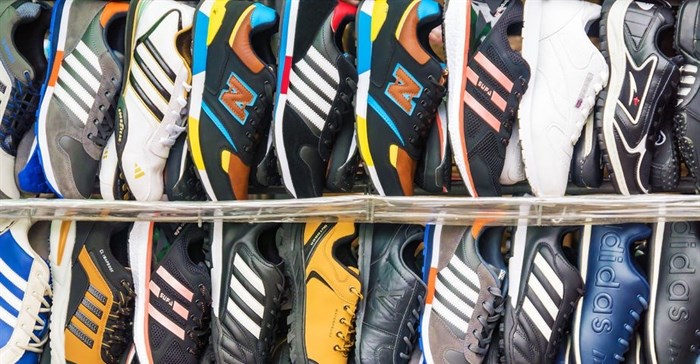






In January 2016, over 30,000 pairs of shoes were seized in a raid conducted by the SARS, while doing a routine customs inspection at the Lebombo border post in Mpumalanga, near Swaziland and Mozambique. South Africa is seen as a net importer of fake footwear. These tips are useful in order to spot fakes:
• Be wary of auction sites. There is no guarantee the item being offered is genuine.
• Be suspicious of ‘look-a-like’ sites. These clues will tell you that the site may not be legitimate:
• Look for links on these particular sites that appear questionable (for example, links to other brands' websites, auction sites, blogs, etc.).
• Look for contact information/email addresses that do not appear legitimate.
• Look for misspelled words or grammatical errors.
• Look for offers for bulk orders.
• Be aware of product quality. Genuine branded products are held to high quality standards related to materials, production, performance and chemical use. Counterfeit products will have defects, strong chemical odours, labels with unknown images or names, etc.
• If you are buying the shoes online, you do not know the quality provided, until the shoes get to your house or business. The seller or website may have pictures of authentic shoes as a cover up, but ship fakes. This is why it’s is vital to authenticate the originality of the product before purchasing it.
Remember: If a deal seems too good to be true, it probably is.
Generally, the majority of the fake goods appear to originate from China. Almost 20% of the total value of seized fake products violates the intellectual property rights of holders registered in the US, followed by Italy at 14.6%, France at 12.1%, Switzerland at 11.7%, Japan at 8.2% and Germany at 7.5%.
Nike as a brand is “seen to be more intensely targeted by counterfeiters", according to the report Trade in Counterfeit and Pirated Goods: Mapping the Economic Impact. The results corroborate a previous World Customs Organisation report that identified Nike as the most frequently counterfeited brand in 2013.
The South African Counterfeit Goods Act states that apart from a court order, declaring the counterfeit goods in question to be forfeited to the state or the goods, packaging and tools used in their manufacture to be destroyed, the Act also introduces strict penalties, which may be imposed upon counterfeiters in the event of their conviction.
“It is hoped that this provision will lead to an increasing number of ‘tip-offs’ from consumers.” – South African Institute of Intellectual Property Law
Any person convicted of an offence in terms of the Act, in the case of a first conviction, is punishable by a fine in respect of each article or item, which fine may not exceed R5,000 per article or item, or imprisonment for a period that may not exceed three years, or both. In the case of a second or subsequent conviction, the fine in respect of each article or item may not exceed R10,000 per article or item, while the imprisonment-term may not exceed five years.
Furthermore, the Act has introduced an interesting provision that operates as an incentive to assisting in the combating of trade in counterfeit goods. Any person who submits any counterfeit goods purchased by him or her to an inspector, together with proof of the price that was paid for these goods, will be entitled to receive payment of a sum of money equal to three times the amount of the relevant purchase price, under certain circumstances.